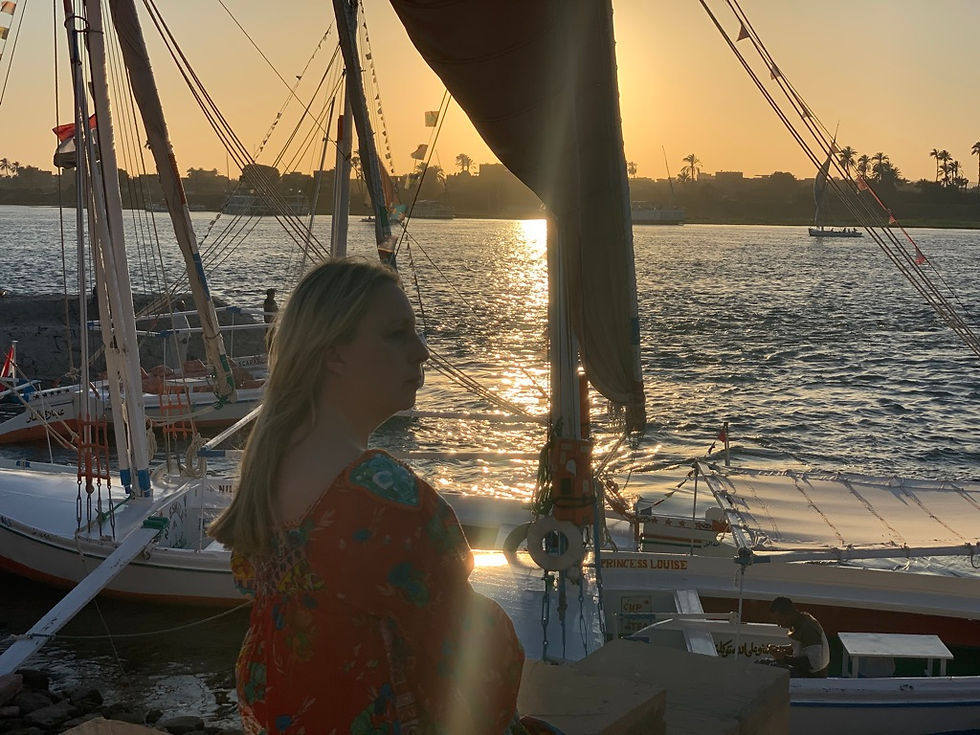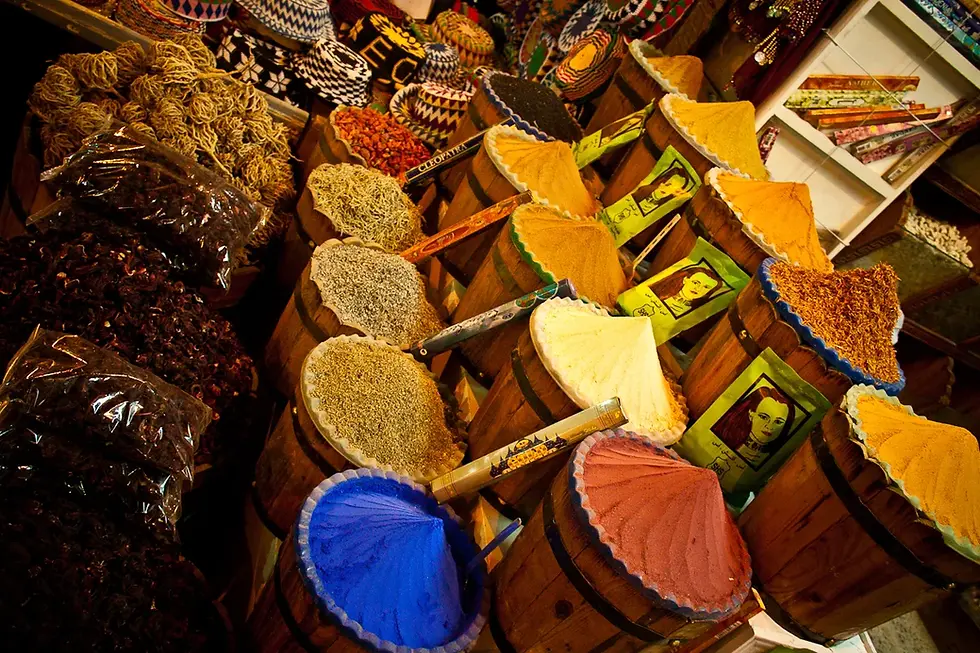SAILING ON THE NILE
- Simonetta Ottone

- Aug 31, 2023
- 5 min read
Egyptian Days March 2023
The biggest part of the work in Cairo is over, so we "take off" in Egypt and fly to Luxor.

We are tired, but history calls, so we visit the Karnak temple twice, with its majestic columns recently restored: some are colored again, as it seems they were at the beginning of everything, before the sand covered them.
We return to the hotel at sunset, which we enjoy on the shore in the middle of the Felukas, the typical boats that sail on the Nile.

In the evening we meet Marusca Ferrucci, a naturopath and Egyptologist from Livorno who has lived in Luxor since 2020: it is a wonderful meeting, in which we share the enchantment and some secrets of that land. Together we visit the local market, where she introduces us to the traders she knows and I go wild buying beautiful traditional fabrics and clothes.

The Temple of Luxor is in the middle of the town, the local inhabitants walk beside it in their daily lives, and they don't even look at it, as happens to those who live in extraordinary places; they are in traditional clothes, as I believe has been happening for millennia, it's 25 degrees, but they are cold, they walk around with the duvet over the "Galabeya", but in slippers without socks (several Egyptians hate them).
Darkness falls, so we do part of the visit by admiring the temple with its lights; it is so out of touch with reality that it seems to be suspended.
Our kids couldn't come for school reasons, so we share part of the journey with them via video call; we would like them to be with us, to make them understand how beautiful the real world is, how much life there is outside the virtual world in which they are immersed.

The next day we cross the Nile by boat: on the other bank, "the western one", there is the great Valley of the Kings, their underground tombs, the Temple of the strong-willed Hatshepsut, who had to take it from her son, King, to claim her power child, and pretend to be a man. Unlike his predecessors, the years of his reign were without wars and aimed at improving the conditions of the country and its people.

Along the way we stop at a factory of alabaster and pure essential oils, the best in the world, used for the most important perfumes.

During the night we enter the Esna Lock: from our ship we follow all the maneuvers carried out "on sight"; it is a delicate operation, useful for accompanying the boats in the different height levels of the river. It is quite impressive, also because it seems to take place in an artisanal way
with lots of people cooperating shouting commands to each other. Impossible to sleep!
The next morning we are in Edfu; at the exit of the ship there are many local street vendors who try to sell to tourists, forming a somewhat excessive human crowd.
As soon as we arrive, some of them approach us with small boats and pull goods onto ours to let us buy their items!
We take the carriage and go to the Temple of Horus: my eyes begin to have no more room for other beauty. I think this should be absorbed calmly but sometimes, as happens in life, you have to stay within a forced rhythm. And so I fill myself with other wonders.

Kom Ombo is one of these, plus we see the Museum of crocodiles, ancient inhabitants of the place.

Meanwhile on the ship we play with Egyptian clothes and, of course, dance!
We arrive in Aswan and the gigantic dam of it; in the evening we go to the local market: I love the Suqs (Arab markets), full of colors, smells of incense and eternity!
Salted river fish has a very strong and nauseating smell, but they advise me to taste it, they say it's delicious and tasty!
Aswan is the best place for spices, so we get all kinds of them, together with Karkadé, Carob and Tamarind with which we make good and healthy infusions.

The island of Philae is a piece of land where stands a beautiful temple dedicated to Isis, saved from the water; it is really difficult to understand how 5000 years ago they could build such tall, often single-block structures and even move them to make the most of their spiritual and energetic meaning.

Once, before the archaeological discoveries, the locals lived inside the temples, so to enhance that priceless heritage they had to move people and relocate them to neighboring areas.

The small motor boat that took us to Nubia allowed me to notice how clean the water of the Nile seems: no oils, no rubbish, no bad smell.
The local kids move between the boats riding a canoe to play: they don't need a paddle, they use their arms and greet us happily! Nubians are very beautiful: their skin is decidedly dark, their features are fine and refined, their bodies long and elegant.
In the Nubian village the houses have typical architectures that seem to smile along the shore; as soon as they get off, some children play in a sort of earth and sand square with the dromedaries with which in the evening, in line, they will reach their earthen houses in the nearby villages.

We visit the School where we are presented with a lesson in the Nubian language (the closest to the real Egyptian language, very similar to Coptic) and in the Arabic language, much more recent and not spoken to each other. It seems that the ancient, true Egyptians were these populations, so educated, polite, in which children seem free and happy, with their clear and open smiles that light up their colors.
We speak with the Master, who invites us to spend some time in the village and to work with the children; he tells us that kids are always on their cell phones today (I would never have imagined it in that riverside paradise!) and that they are no longer interested in anything, and adds: “They have put the war into our hands, into the hands of our children! ”.

The Nubian houses are white and light blue, spacious inside with large carpets. They are "co-living", more people and families live there with private rooms and collective spaces. Instead of cats or dogs, they keep small crocodiles on the sofa (only the small ones manage to pass the dam), which then grow up in a part of the house dedicated to them, and grow old with the family who then takes care of embalming them.

Evening has fallen and we return by boat to our ship, retracing the river and the silence.
In the evenings we dance with Nubian performers, with their colorful costumes and more distinctly Afro dance than in the northern area around Cairo.

The next morning we get up very early to go to the Abu Simbel Temple; it is a long journey, often on dirt roads.

The landscape changes from green to brownish to yellow; the land is flat and arid, a long stretch of desert bordering Sudan.
I forgot my hat, so the driver arranges my scarf their way; I don't like covering up, but in this circumstance I need it!

It is early in the morning, but the sun is already high and strong. Africa calls with an ever clearer voice.
And I feel it, beyond the horizon.







Comments